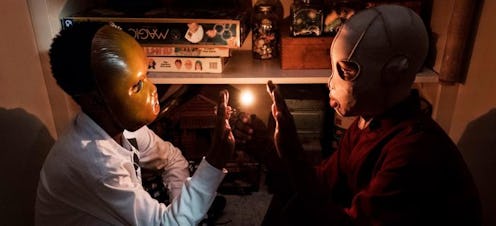Entertainment
We Figured Out What The ‘Us’ Ending Actually Means & It’s Not Good
Major spoilers for Us ahead! A more straightforward horror movie than his previous film Get Out, Jordan Peele's Us is a home invasion story told on a grand scale. While the creepiness of the genre lies in having deeply personal space violated by sadistic strangers, usually with no real reason, Peele's added twist is the attackers look exactly like the Wilson family they're targeting. Add in a bizarre setting for the final showdown (rabbits?!), and the meaning of the Us ending isn't so easily defined.
The film's opening — a long shot of rabbits in cages in some unspecified underground room — hints at what's to come, though audiences can be forgiven for not guessing that from the start. Peele told the BBC about his mixed personal feelings about the fuzzy symbols. "I'm not afraid of them but I do find them scary. They're very cuddly but they also have a sociopathic expression, and they kind of look past you in a creepy kind of way. Not the biggest brains, rabbits," he said. That, and the fact that rabbits have been and are still used in lab testing explain their presence among abandoned experiments the Tethered.
The entire film, moviegoers are rooting for Adelaide (Lupita Nyong'o) her husband and two children to defeat their doppelgängers. We watch daughter Zora (Shahadi Wright Joseph) brutally stab the double of her family friend; Adelaide kill without remorse; and father Gabe (Winston Duke) flinch as his double is ground up by a boat motor. Later, there's a humorous beat where the family argues about who gets to drive based on their "kill count," downgrading the Tethered further from human to, well, other.
It's only during the film's final scene that we learn the "us" we've been rooting for has been one of "them" the entire time. Adelaide knows not only the hidden funhouse entrance leading underground, she's also easily able to navigate the maze of tunnels to the one-way escalator, leading to the eerie abandoned-mall-like halls the Tethered spent their entire lives in.
The person we've known as Adelaide managed to escape that underground when she was a child, but forced the real Adelaide to take her place, inadvertently setting in motion the events of the film. Before that, the Tethered, abandoned by whichever government group it's implied created them, were trapped by psychosis brought on by their inescapable living conditions and their total lack of autonomy, being at the physical whim of whatever their topside counterparts freely chose to do. As an above-ground human, the real Adelaide has abilities and qualities that make her a "chosen one" of sorts. She's the leader the Tethered need to plan their takeover.
Adelaide manages to destroy her double, and the film ends with the family driving away, miles and miles of red-jumpsuited Tethered holding hands over hills and valleys in mockery of 1986's Hands Across America campaign. But it's clear from looks exchanged that son Jason knows, or at least suspects the truth, and the chilling smile Adelaide gives him shows she remains determined as any Tethered to get and hold on to a better life.
There's little subtlety in Peele suggesting that the Tethered are a literal lower class — so low as to be living underground — that well-off Americans don't even know exists. The events of the movie are the breaking point they'll reach, where the only solution to extreme repression is violent uprising, seen as coming out of nowhere only by the complacent. The Wilsons have the advantage of someone who's aware of the Tethered's existence; from the bodies dropped everywhere and their family friends' slaughter, it's clear that no one else saw this coming.
The creepiest element of the film is how much Adelaide is "us" — she knows about and comes from this group, yet kicks the ladder away and not only doesn't help, but actively fights against the Tethered's efforts, despite knowing why they're so bitter. It's open for the audience to relate that to America's long history of military intervention in the Middle East and in South America, or even the blander current situation with millennials struggling financially while Boomers take them to task in the media.
Jason's seen though, and knows. Combined with the final swooping shot of the unmissable, unmoving Tethered lining the country, Us suggests that acknowledging — seeing — is the first step that needs to happen before any atrocities can begin to be reconciled. And just as Jason realizes that his own mother is a part of the problem, we'll all have to make uncomfortable acknowledgements if we're to end the false binary of "Us" vs "Them."
